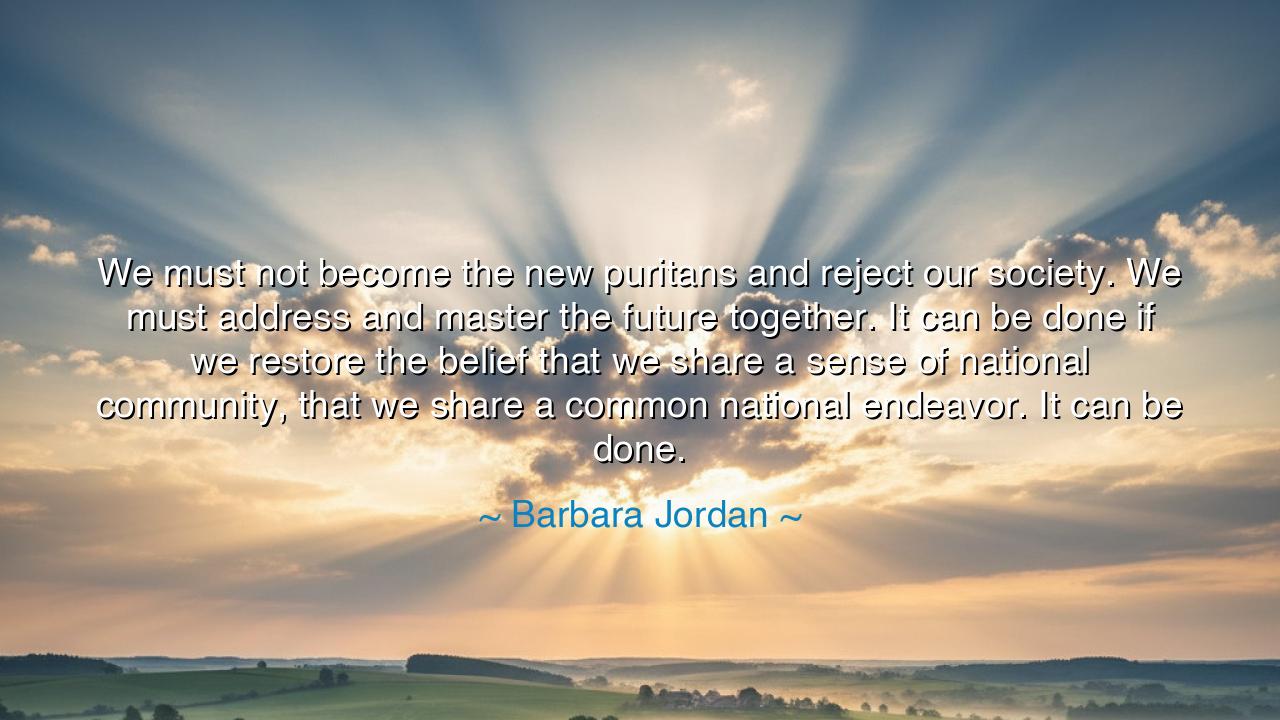
We must not become the new puritans and reject our society. We
We must not become the new puritans and reject our society. We must address and master the future together. It can be done if we restore the belief that we share a sense of national community, that we share a common national endeavor. It can be done.






In the sweep of history, there are moments when the future of a people seems uncertain, when divisions threaten to tear apart the bonds that hold a society together. Barbara Jordan’s words, "We must not become the new puritans and reject our society. We must address and master the future together. It can be done if we restore the belief that we share a sense of national community, that we share a common national endeavor. It can be done," ring with the clarion call to unite, to not retreat into isolation or rejection, but to embrace our shared purpose and future. Her message is one of hope, of collective strength, and of the immense power that arises when people come together with a common cause.
In the ancient world, societies faced similar challenges—times when they could have easily crumbled under the weight of division and discord. The rise of the Roman Republic is a powerful example. In its early days, the Roman people were deeply divided, their society filled with conflict between the patricians (the aristocratic class) and the plebeians (the common folk). Yet, the Romans recognized the importance of unity, of working together despite their differences. Through the creation of the Tribunes, the plebeians gained a voice, and the Republic began to move toward a more unified and equitable future. This moment of reconciliation—the decision to address the future together—became the foundation of Roman greatness, as they learned to master their collective destiny.
Barbara Jordan’s call to not become the “new puritans” is a warning against isolationism and the temptation to reject the world and society because of perceived flaws. The Puritans, in their quest for religious purity, sought to isolate themselves from the broader society, convinced that the world was irredeemable. But history shows that such an approach does not lead to progress; rather, it stunts growth. Perfection, as the ancients knew, is not found in isolation, but in the struggle, the engagement with others, and the collective effort toward a better future. Societies that reject this truth often find themselves trapped in a cycle of self-righteousness, their potential stifled by their own refusal to cooperate and grow with others.
Take, for example, the story of Nelson Mandela and the apartheid system in South Africa. For decades, the nation was deeply divided, its people torn apart by the walls of racial injustice. But Mandela, in his wisdom, refused to let his people become the puritans of their own time, trapped in hatred and division. Instead, he called for reconciliation, for a collective national endeavor to dismantle the walls of apartheid and build a new, unified South Africa. It was not an easy task—there were deep wounds, and the temptation to reject the society that had oppressed them was great. Yet, Mandela’s belief in a shared future, his call to work together for a common good, was what ultimately allowed South Africa to heal and transform.
Barbara Jordan’s message speaks not only of unity but of shared responsibility—the idea that we are all bound together in the fabric of our national community. This is the very essence of human civilization: that we are not isolated individuals, but part of something larger than ourselves. The ancient Greeks, in their democracy, understood this well. The concept of citizenship was built on the idea that each individual had a role to play in the welfare of the state. To reject one’s duty to the collective was to weaken the very foundation upon which the society rested. Similarly, Jordan’s call for a national endeavor is a reminder that we must each take responsibility for the health and future of our society, for only together can we address the challenges of the future.
The lesson here is clear: we must resist the temptation to withdraw into cynicism or isolation. The future cannot be mastered by those who reject society and its imperfections. Rather, we must engage—actively participate in shaping our collective destiny, working together toward a future of justice, prosperity, and unity. The power to create a better world lies not in the hands of the few, but in the hearts of the many who choose to believe in the strength of their shared purpose.
Thus, the practical action we must take is this: reach out to those around you, regardless of their background, and join in the common task of creating a better future. Speak up for unity, for the belief that we are stronger together. Just as Mandela led his people toward a unified South Africa, and as the Romans worked to overcome their divisions, so too must we today choose to build bridges, not walls. Master the future together—not through division and isolation, but through cooperation, understanding, and a shared vision of what we can become. The work is difficult, but as Barbara Jordan so rightly says, "It can be done." And through this collective effort, we will create a future worthy of our shared potential.






AAdministratorAdministrator
Welcome, honored guests. Please leave a comment, we will respond soon